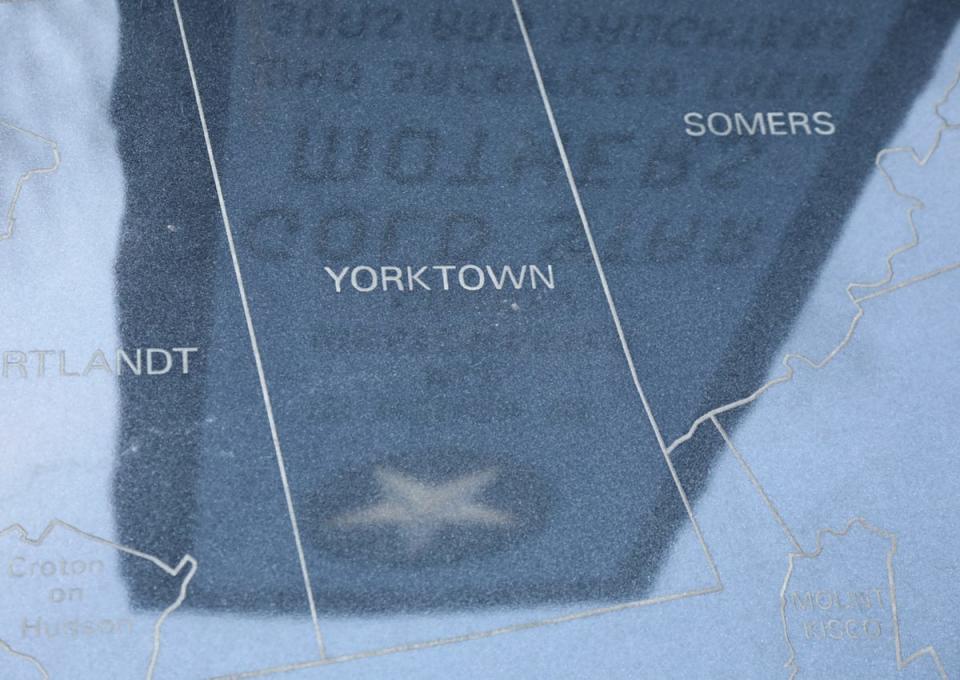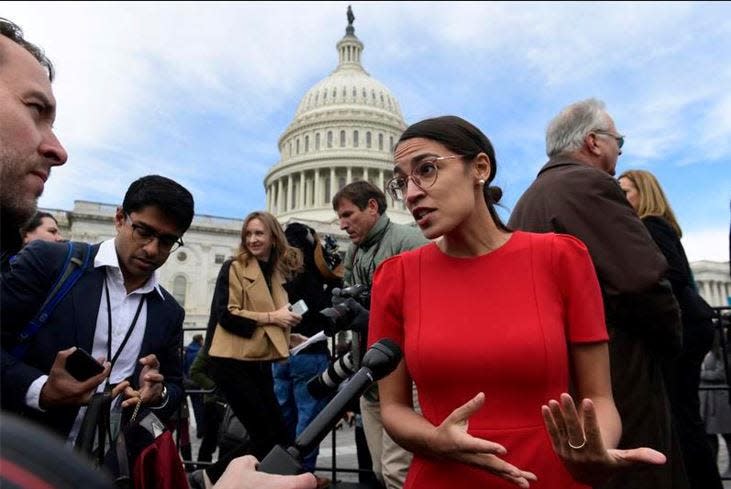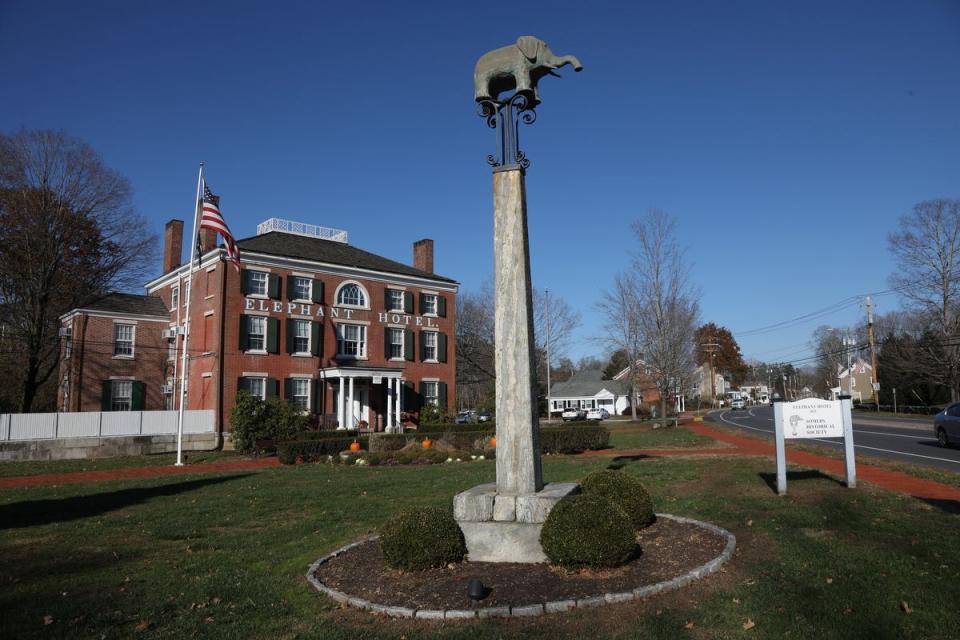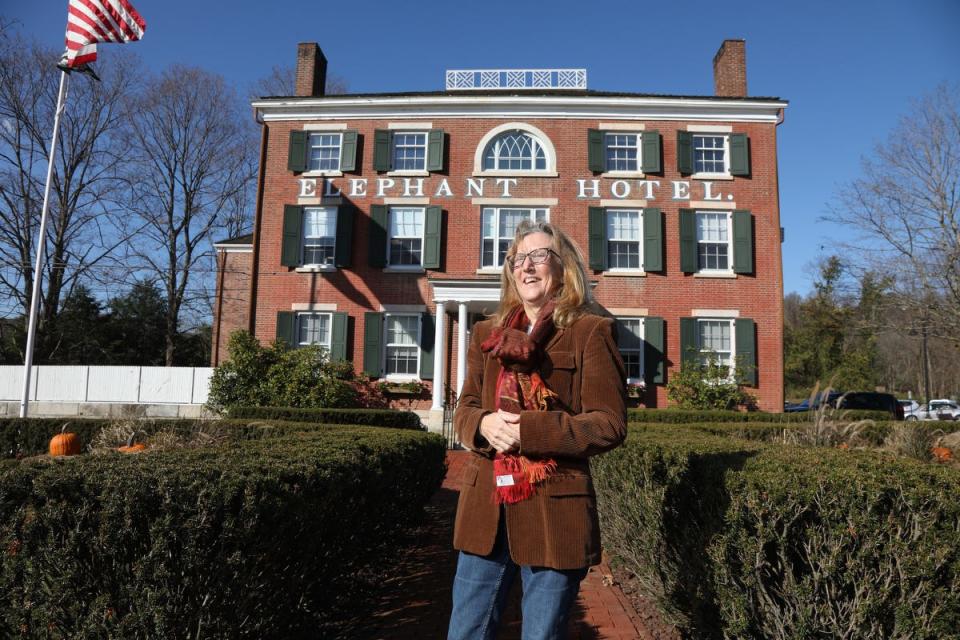Last GOP bastions in suburban NYC face a difficult question: Do they even mention Trump?
From Delaware — home state of former Vice President and Democratic presidential front-runner Joe Biden — north to New Jersey and the suburbs of New York and on to Vermont and New England, Democrats can count on heavy support in the 2020 election. And yet, as veteran USA TODAY NETWORK columnist Mike Kelly and visual journalist Chris Pedota found, resilient pockets of Trump supporters persist amid this Democratic landscape. This is the fourth installment in a five-part series,"Red Islands in the Blue Sea.”
YORKTOWN, New York — Matt Slater, a staunch Republican and loyal supporter of Donald Trump, devised an unusual campaign strategy when he challenged a Democratic incumbent for the top municipal job in this community in northern Westchester County of rolling hills and long driveways.
Slater — who went to high school in Yorktown with ultra-liberal Rep. Alexandria Ocasio-Cortez, a Bronx Democrat — barely mentioned that he was a Republican. He said even less about Trump.
He won.
"My campaign didn’t focus on the White House," said Slater, 33. "It focused on the homes of middle-class families in Yorktown."
Being a Republican in Westchester County, a sprawling landscape of suburban wealth and power that is home to nearly 1 million residents just north of New York City, used to be a communal rite of passage. Voting Republican was as common as the smell of fresh-cut grass on a bucolic golf course.
Joining the GOP was considered the first step to ascending the county's economic, religious, academic and social power structure — and for good reason. Westchester was, after all, the springboard for such moderate Republican stalwarts as Nelson Rockefeller in the "Mad Men" era of Brooks Brothers suits, three-martini lunches, stay-at-home mothers and all-male train commuting to Manhattan. Years later, Westchester became the base for the political ascendancy of another middle-of-the-road Republican, George Pataki.
But in the last two decades, Westchester’s political topography — like that of other suburbs across America — changed dramatically.
Republicans, especially Trump supporters, have had to change, too.
As Trump faces possible impeachment, many local suburban Republican officials have distanced themselves from the president.
Most say it’s a matter of survival.
In the era of Trump, merely joining Westchester’s Republican Party has suddenly become a risky political choice — unless, of course, you enjoy being on the losing end of elections. Republicans in other wealthy suburban enclaves such as New Jersey’s Bergen County and Virginia’s Fairfax County say they feel the same pressure to downplay their party affiliation.
But Westchester appears to be in an especially difficult terrain for Republicans, largely because of the region’s intense antipathy to Trump, experts say.
Democrats now control every countywide office and, after last month's elections, dominate the county’s board of legislators by 15 to 2. As if that were not enough, Democrats also hold every congressional and state legislative seat in the county except one — and that lone Republican, state Assemblyman Kevin Byrne, represents a district that includes a swath of heavily Republican Putnam County.
With such electoral might, it’s not surprising that registered Democrats now outnumber Republicans by more than 2-to-1 in Westchester.
But that gap may grow even larger. In just the last year, more than 8,000 voters declared their allegiance as Democrats while nearly 4,000 former Republican voters shed their party affiliation.

Suburbs slide away from GOP
Such trends are being repeated in suburbs across America, said Lawrence Levy, the executive dean of the National Center for Suburban Studies at Hofstra University. Suburban Republicans, he said, are not just running from Trump but "running for their political lives.”
Levy noted that many longtime Republicans — especially moderates in the mold of Rockefeller, Pataki and New Jersey’s former Govs. Tom Kean and Christine Todd Whitman — believe that the party that Trump now dominates has left them behind.
"It’s not their party anymore,” Levy said.
That nationwide struggle within the Republican Party bubbled to the surface in especially alarming ways for Westchester Republicans during the 2016 presidential election.
Running against Democrat Hillary Clinton, who lives with her husband, former President Bill Clinton, in the Westchester community of Chappaqua, Trump managed to win only 31% of the county vote. He won a majority of votes in only two of Westchester’s more than two dozen cities and towns — Yorktown and its smaller neighbor on the county’s northern border, Somers. But those victories were hardly overwhelming. Trump squeaked by in Yorktown by just 57 votes. He took Somers by only 105 votes.
Such narrow margins weighed heavily on Slater’s mind when he decided to run for Yorktown supervisor, a full-time post with an annual salary of $122,845 that is a combination of mayor and town administrator.
Once a reliable GOP bastion, Yorktown, which was named after the Revolutionary War battle in Virginia in 1781 that sealed the colonists' victory over British forces, has become a mix of Republicans and new Democratic arrivals in recent years.
Yorktown's 36,000 residents have long been familiar with Trump — and not just because of his politics. In the 1990s, Trump paid about $2 million for an undeveloped 438-acre tract in Yorktown. He soon announced grandiose plans for a golf course and series of housing developments. But Trump's plans fizzled, and in 2006, he donated the land to New York State, which established the "Donald J. Trump State Park."
With Trump now in the White House and facing rising voter aversion in Westchester, Slater wondered how he might run for office as a Republican and bypass the possibility of being tarnished by the president. His dilemma worsened in 2018 when he saw how the anti-Trump electoral backlash swamped state Sen. Terrence Murphy, once considered a Republican star in New York state politics.
This year, amid calls for Trump’s impeachment and with Democrats gaining power in suburbs across the nation, Slater, Murphy’s former chief of staff, opted to downplay his party affiliation in his race to unseat Yorktown’s Democratic incumbent supervisor, Ilan Gilbert.
As for Trump, Slater kept mum about him, too, despite a concerted effort — and reams of campaign fliers — in which Yorktown’s Democrats attempted to portray Slater as a Trumpian stooge. Instead, Slater focused his grassroots campaign on two issues that cut across party lines: taxes and the environment.
“People are just tired of the nonsense coming out of Washington," Slater said in an interview. "They’re tired of what comes from both sides of the aisle."
The strategy worked. Slater rolled to victory over Gilbert with nearly 53% of the vote — a 607-vote margin.

Against AOC's childhood backdrop
Slater also avoided the temptation of criticizing one of the most controversial Democrats to come from Yorktown, Ocasio-Cortez.
The outspoken congressional representative is considered a leader of the anti-Trump “squad” of ultra-progressive, first-term House members that includes Reps. Ilhan Omar of Minnesota, Ayanna Pressley of Massachusetts and Rashida Tlaib of Michigan.
Ocasio-Cortez, 30, moved to Yorktown from the Bronx as a young girl with her family. At Yorktown High School she was known as “Sandy” and had a flair for microbiology.
Slater, who also grew up in Yorktown, remembers Ocasio-Cortez well. He was a senior when Ocasio-Cortez was a freshman.
“We crossed paths a few times,” Slater said, adding, however, that the two were not close friends.
Nonetheless — and perhaps in keeping with his decidedly nonpartisan approach now — Slater said Yorktown should take pride in Ocasio-Cortez’s sudden political rise.

“It’s a tip of the hat to Yorktown,” Slater said. “The town should be proud of itself that the town is producing leaders.”
Lee Miringoff, the director of the Marist Poll, said Republicans like Slater are typical of a fledgling breed in a party searching for ways to balance allegiance to Trump while preserving its voter base — especially in communities like Yorktown.
“Republican candidates in the present climate and with Trump as the national face are going to have to find ways to appeal to voters that separate themselves” from the president, Miringoff said.

Crossing party lines
That appears to be the case in Yorktown’s smaller neighbor, Somers.
Somers, which is named after Richard Somers, a U.S. Navy captain from New Jersey who was killed in 1804 during the First Barbary War in Africa, is one of only two Westchester towns — the other is Eastchester — that maintain a majority of Republican voters.
But Republicans and Democrats in Somers, whose roughly 20,000 residents once included Democratic presidential candidate Andrew Yang, have embraced an unofficial peace pact in which the two sides will occasionally endorse candidates from the opposing party.
In this fall’s local elections, the Somers Republicans endorsed the reelection of the lone Democrat on the town council, Richard Clinchy. Two years ago, Democrats endorsed the reelection of two incumbent Republicans.
“We also understand that one-party rule is counterproductive,” said T.J. McCormack, a former stand-up comic and talk-radio host who now heads the Somers Republican Party.
Speaking of his party’s endorsement of Clinchy, McCormack said that “even though he is a moderate Democrat, there is still a perspective that he brings to the table. He’s a good guy.”
Such sentiments — once common in American politics — have largely disappeared from the national political scene. But in Somers, the notion of “cross-endorsing” another party’s candidate has become a key to Republicans' maintaining a toehold of power.
In Somers, both sides deliberately made a point of not allowing the uber-partisan battles in Washington to affect their local debates.
“We don’t discuss federal issues," said the Somers town supervisor, Frederick “Rick” Morrissey. “It’s really not productive.
“We’re in a bubble,” he added.
Morrissey’s statement came in a brief but tense interview in which he was asked about Trump and why his town and neighboring Yorktown were the only Westchester communities to support the president in 2016.
"I’m not going to talk specifically about the president,” Morrissey said.
Asked if he voted for Trump, Morrissey refused to answer, tersely noting: “I don’t tell people who I vote for.”
“It’s not productive to discuss anything that’s controversial, Republican or Democratic,” Morrissey said. “You could go on about Pelosi. You could go on about Trump. To what end? It doesn’t serve my interests. Here in Somers, is anybody talking to me about the current president, the current speaker of the House? I can tell you no.”
That’s not exactly true.
A few days after Morrissey described his town's delicate habit of keeping the peace between Republicans and Democrats, while also avoiding any talk about Trump or other national issues, several stalwart Somers Republicans gathered a floor above his office in the town’s municipal building.
Somers' municipal government is headquartered in a three-story Federalist-style edifice known as the Elephant Hotel. But the name — and its statue of an elephant in front of the building — has nothing to do with the mascot of the Republican Party.
The “hotel,” built in 1821, was the handiwork of circus impresario Hachaliah Bailey. The name pays homage to Bailey’s favorite elephant, “Old Bet,” who lived on a farm in Somers and became a tourist attraction.

Seated in the hotel’s Museum of the Early American Circus, which occupies several rooms on the hotel’s top floor, Grace Zimmermann, 60, the head of the town’s historical society, was hardly shy about admitting that she voted for Trump.
“It was as much a vote against Hillary Clinton as it was for him,” Zimmermann said. “I liked the fact that it was somebody new, a political outsider, a successful businessman.”
Zimmermann said she is delighted with the surging economy under Trump and with the president’s attempt to stop undocumented migrants from crossing the nation’s border with Mexico.
“I’m all for immigration,” she said. “I just believe that people should come here legally.”
Zimmermann is also proud that Somers officials such as Morrissey purposely try to get along with their political rivals.
“This town is unique,” she said. “People will vote for the person and not the party. They get along. I’d like to take this town and shove it in people’s faces and say: ‘Look, we can get along here. What’s wrong with you?’ ”
“Yeah,” she added, “everybody’s got their special interests. That’s human nature. But they’re not going to not vote for something because you’re a Republican or a Democrat.”

Across town, Rosalie Cicogna, 72, a former chairwoman of the Somers Republican Committee, would like to see her party embrace Trump more enthusiastically. She points to a growing anger among middle-class Americans toward illegal immigration and an improving economy as key reasons to support Trump and not hide from him, as other Westchester Republicans are doing.
“Let’s be honest, OK? He’s not a wordsmith,” Cicogna said. “The mouth goes before the mind engages. But he’s keeping the promises he’s made.”

'The mood changes'
The balance between expressing an unvarnished loyalty to Trump and trying to keep a distance from him worries some party leaders. They point out that Republican identity in Westchester — and perhaps in other suburbs across the nation — could erode even more if the party distances itself too much from its leader.
"We're seeing a breakdown in the Republican base," said the Marist Poll's Lee Miringoff.
Such an ominous prediction, while perhaps harsh, is a fate that some Republican leaders are now grudgingly accepting — at least for the near future.
Rob Astorino, the former two-term Republican Westchester executive who was defeated by Democrat George Latimer in 2017 amid an anti-Trump surge, said his party is still trying to find ways to create a new footing in the suburbs.
Astorino, with his conservative fiscal views and an articulate style that was shaped by his years as a radio producer, was once thought to be a rising star in New York politics. He challenged Democratic Gov. Andrew Cuomo in 2014. And while Astorino lost to Cuomo, the party still felt he might eventually become governor.
Not so anymore.
Astorino now finds himself as one of the few Republicans who are willing to venture onto CNN as a Trump defender. He also serves on the Trump campaign advisory board.
And while Astorino sees Trump as winning reelection in 2020, he has no illusions about how once-Republican Westchester will vote.
“Westchester has been trending Democratic for a couple of decades,” he said. “That’s politics. The mood changes, and there is nothing you can do about it.”
Mike Kelly is a columnist for the USA TODAY NETWORK. Email: kellym@northjersey.com Twitter: @mikekellycolumn
This article originally appeared on Rockland/Westchester Journal News: Donald Trump: Westchester Republicans face a difficult question

